

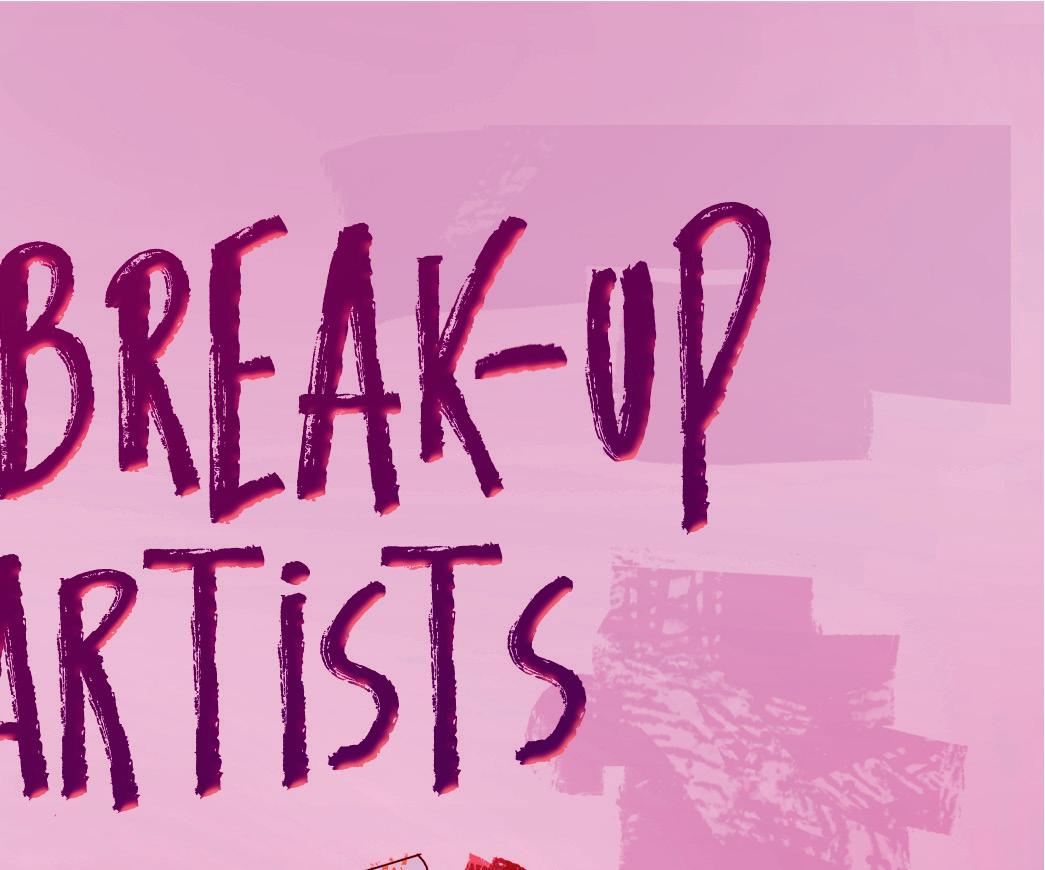
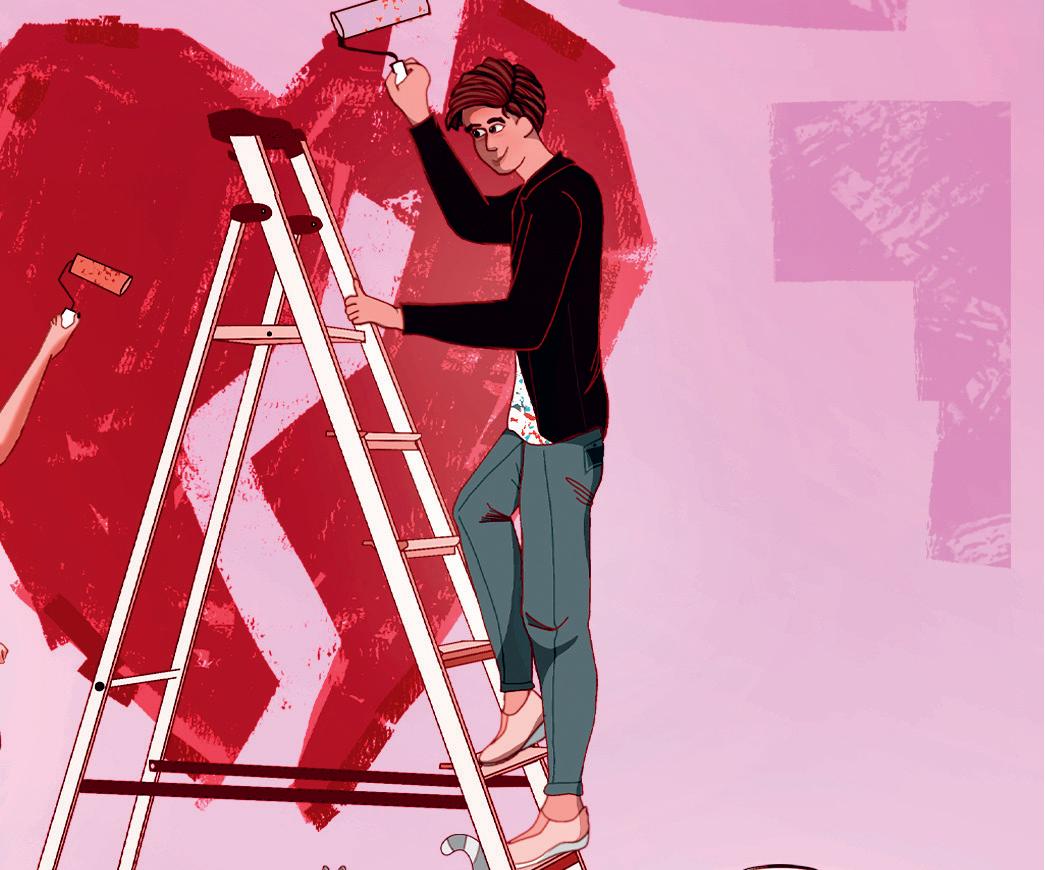
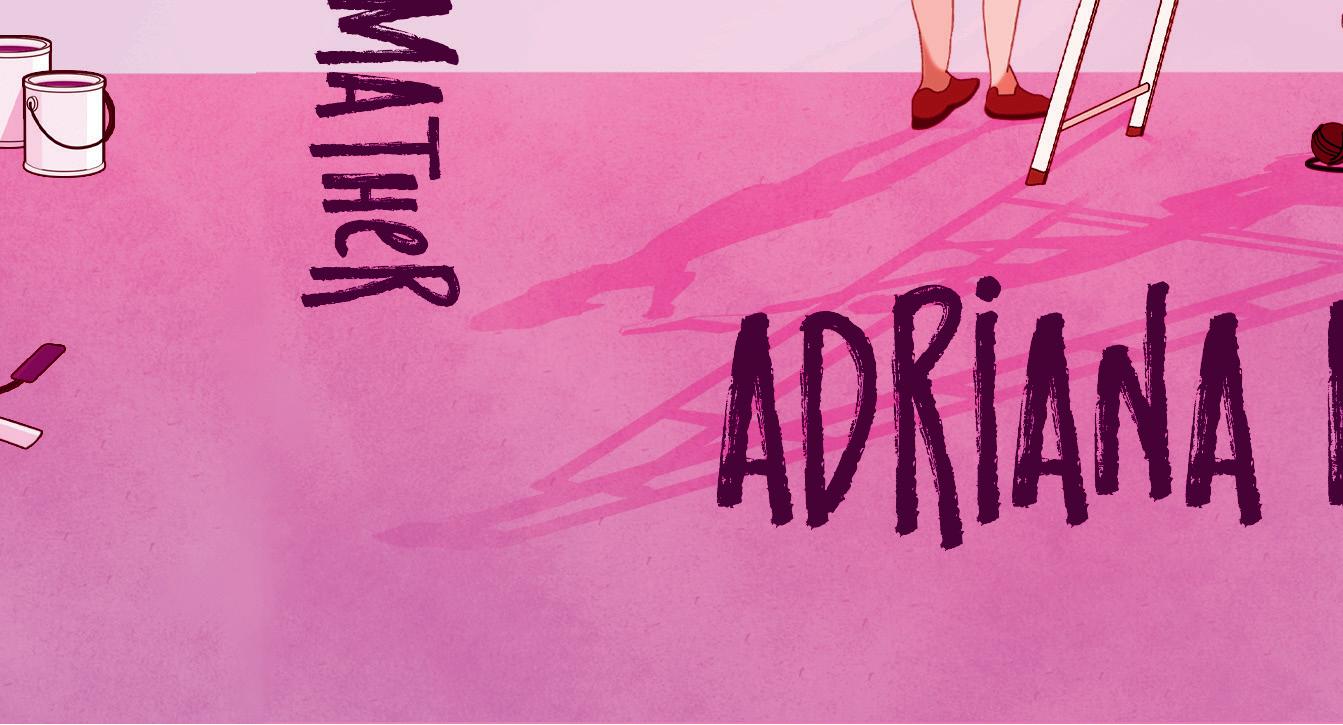








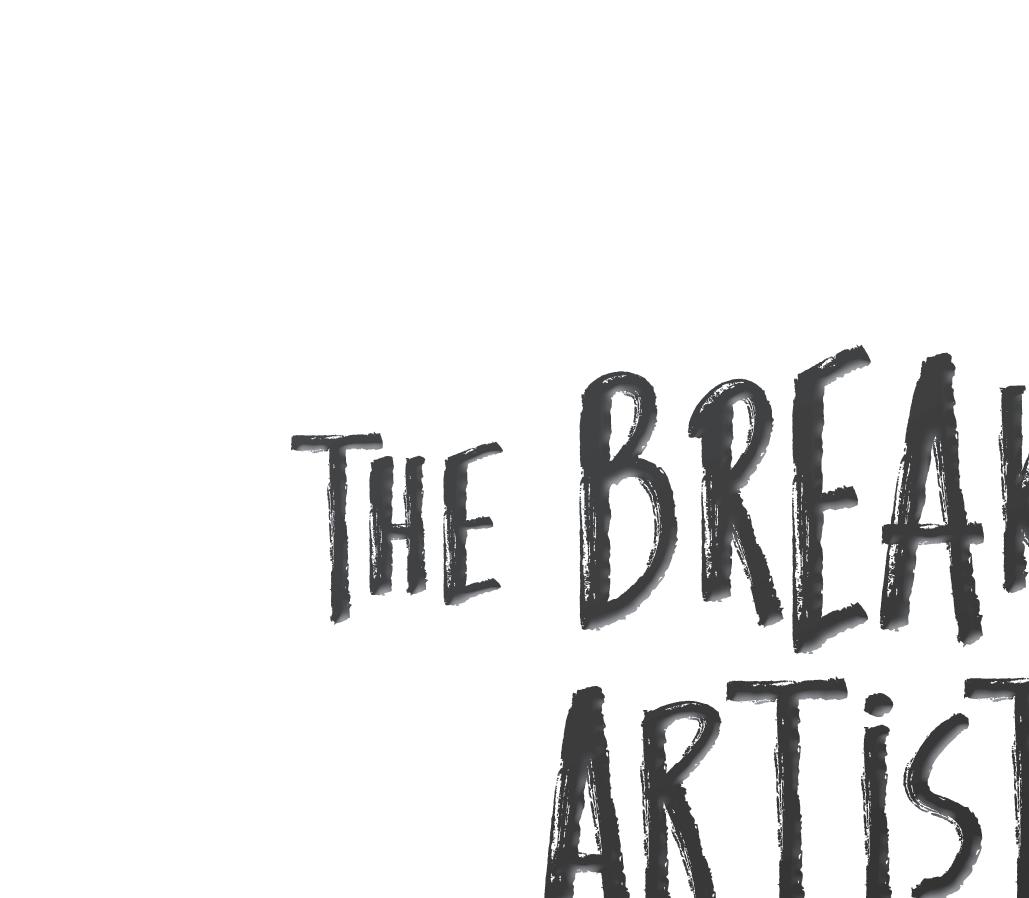
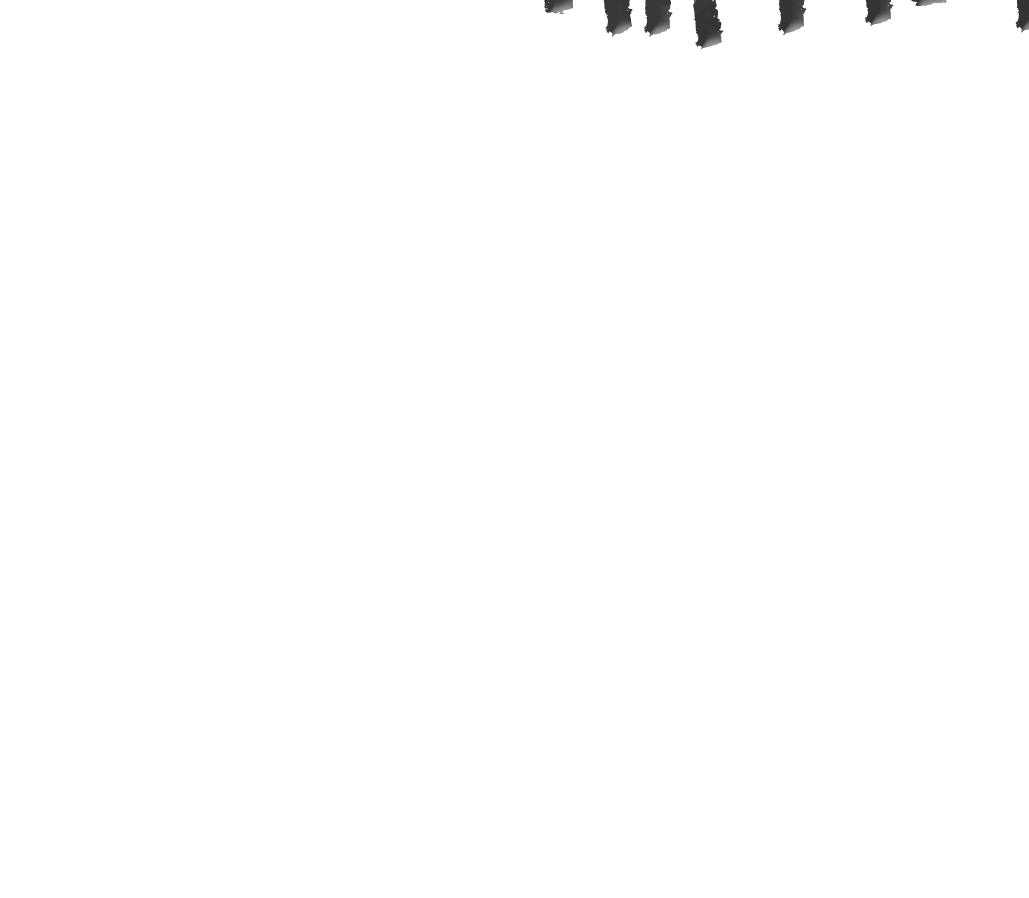



STANDALONE NOVELS
e Break-up Artists
Mom Com
HOW TO HANG A WITCH SERIES How to Hang a Witch Haunting the Deep
KILLING NOVEMBER SERIES
Killing November
Hunting November
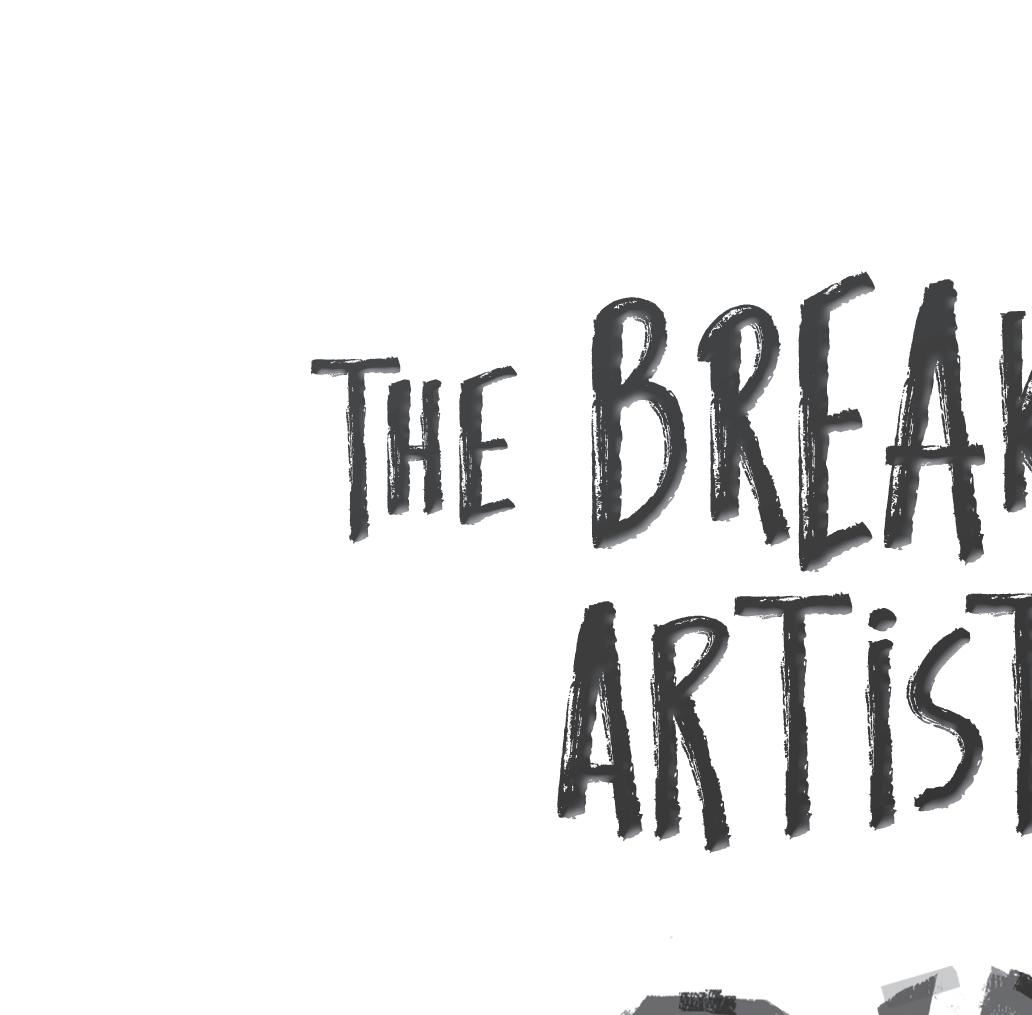
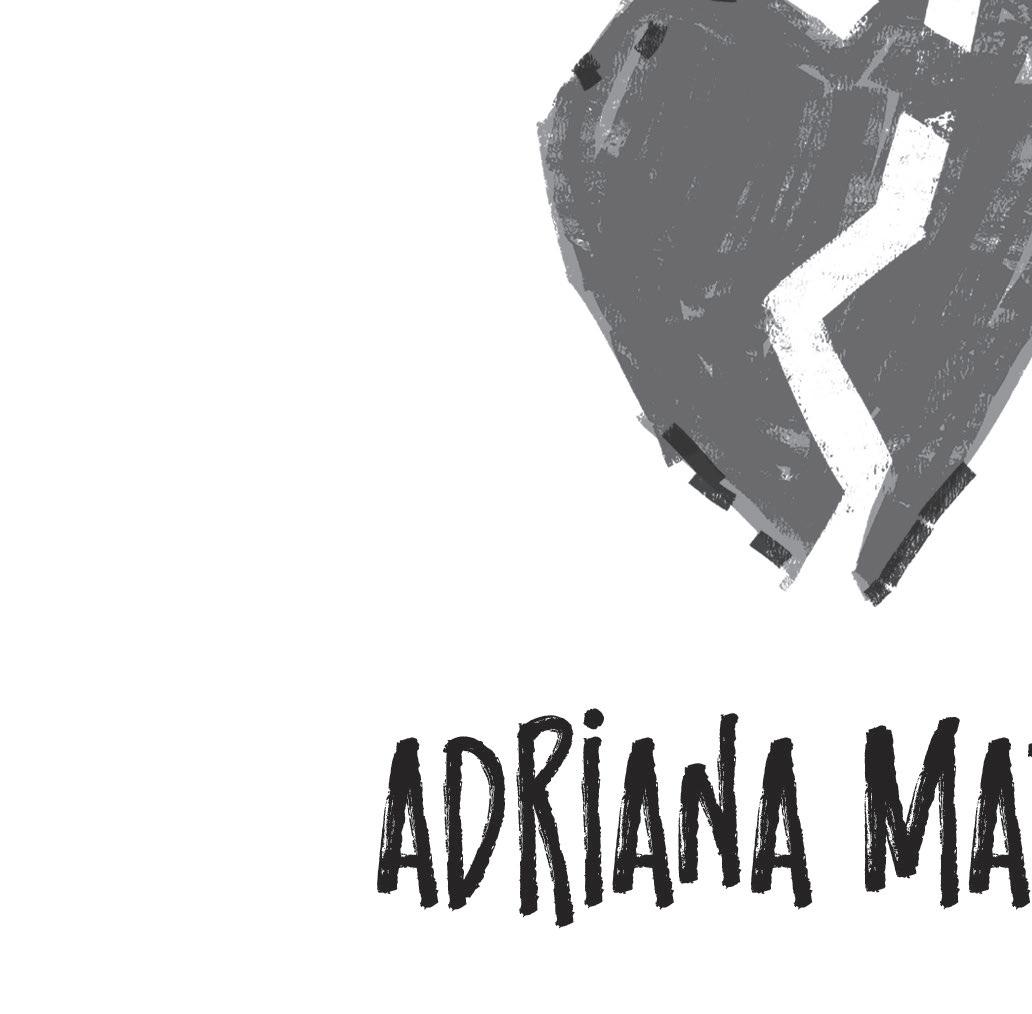

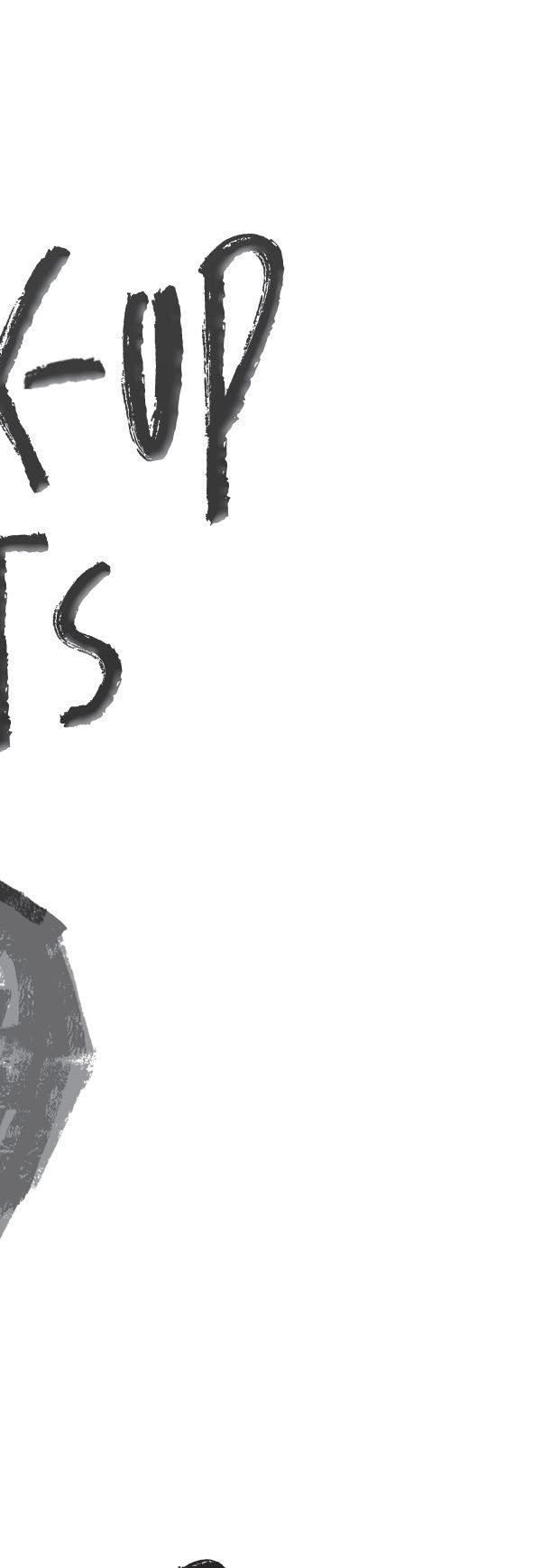
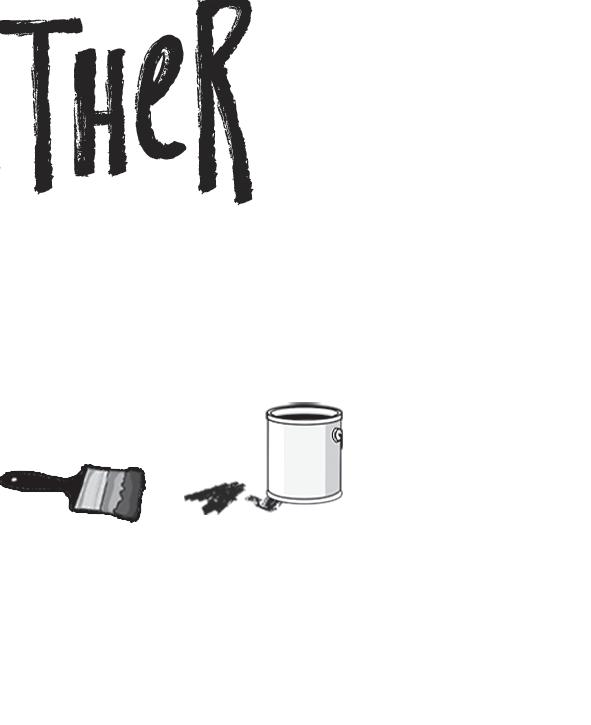
UK | USA | Canada | Ireland | Australia
India | New Zealand | South Africa
Penguin Books is part of the Penguin Random House group of companies whose addresses can be found at global.penguinrandomhouse.com
www.penguin.co.uk www.puffin.co.uk www.ladybird.co.uk
First published in the USA by Blackstone Publishing, and in Great Britain by Penguin Books 2024 001
Text copyright © Adriana Mather, 2024
The moral right of the author has been asserted
Cover and book design by Sarah Riedlinger
Printed and bound in Great Britain by Clays Ltd, Elcograf S.p.A.
The authorized representative in the EEA is Penguin Random House Ireland, Morrison Chambers, 32 Nassau Street, Dublin D02 YH 68
A CIP catalogue record for this book is available from the British Library
ISBN : 978–0–241–68049–0
All correspondence to: Penguin Books
Penguin Random House Children’s
One Embassy Gardens, 8 Viaduct Gardens, London SW 11 7BW
Penguin Random Hous e is committed to a sustainable future for our business, our readers and our planet. is book is made from Forest Stewardship Council® certified paper.
For Candis, my first best friend. You pushed a boy off a running track at school when we were five because he was mean to me. And the next year I took a boy’s chair out from under him for hitting you in the head with his notebook. Luckily, neither of us wound up in the mafia, but I do think we’d make an excellent two-woman team in an adventure novel!
And in memory of Smeagle (Swee in this book)—my soulmate cat bestie. ank you for living a full twenty-two years and for being the strangest and most wonderful creature I’ve ever met. You snored, you relentlessly stuck your paw in my coffee and my water, and you slept under the blankets and would bite my legs as you pleased. ere was no better snuggler and no bigger heart. I’ll love you forever.
While I don’t believe in soulmates and I’m not convinced true love isn’t just a pretty idea used to sell movies and holiday cards, the fact that we’re helping people matters.
I get out of my Jeep Wrangler (or rather Valentine’s Jeep that I’m pretending is mine) in the parking lot of the Italian restaurant where Alice, Valentine, and I hung out for the first time three weeks ago. I’m exactly on schedule—her boyfriend is always late and I’m aiming to be nothing like him. And while I’m usually on time in general, she doesn’t know that, because the truth is she doesn’t know anything about me, not really. Alice spots me from across the lot and runs up as the Jeep door clicks shut, all smiles, throwing her arms around my neck for a quick hug. It’s hard to believe this is the same girl I met three weeks ago. She was quiet, hiding herself behind oversized hoodies with her arms always crossed. Now she’s all big energy—shoulders back and head held high. “You’re here!” she squeals.
I laugh, but before I get a word out, she’s talking. Fast. “Oh my god. I did it. Don’t get me wrong, I fully planned on doing it, but
part of me thought I’d chicken out, ya know? But nope, I broke up with him!” She puts her hand on her forehead in disbelief, jostling her blond-tipped curls.
I lean back against the Jeep door. “How’d he take it?”
“Just like you said. First he was confused. Then upset, blaming me for everything. And then he cried and swore he’d change. How did you know he’d—”
I shrug. “He’s a guy. I’m a guy. We’re simple creatures.”
“Well, maybe, but he’s nothing like you,” Alice says, and now she’s leaning in, close enough that I can smell her citrus body lotion.
And before I can redirect, she wraps her arms around my neck and kisses me. Her eyes are closed. I know this because I see them, because my eyes are open. I also know how long this kiss will last. Three seconds. This is a thank-you kiss. They’re never long.
Three . . . two . . . one . . .
She pulls away. “Thank you,” she says.
See.
She steps back and I feel my face flush.
“I didn’t do anything,” I reply, some of my embarrassment leaking into my voice.
“But you did. I was in a . . . not-so-good place and . . .”
“And you pulled yourself out of it,” I say, giving her full credit—not me, not Valentine, not weeks of strategizing to help—just her.
Alice nods. “I knew he was every kind of wrong for me. I just hadn’t checked in with myself in so long that I didn’t know who I was anymore.” She spreads her arms and the corners of her mouth tilt up. “But tell me, what do you see when you look at me now?”
I smile back. “Hmmm . . .” I say, drawing out my answer, because this is my favorite part—the happy aftermath of an overdue break-up. “I see someone who’s creative and funny; someone who’s interesting and kind.”
Now it’s her turn to blush. Her gaze wanders to my lips, indicating she’s definitely considering kissing me again, and so I start talking and shift my weight so there’s more distance between us.
“I’m really happy for you, Alice,” I say, choosing the perfect line to begin our end.
“Maybe even happy for . . . us ?” she asks with a hopeful smile.
This isn’t the first time someone wanted something more, but it’s never my goal. Valentine and I try to show up as exactly the friends the person needs to see their life more clearly. Often all it takes is us believing in them and reminding them they’re great. But sometimes that kindness gets confused for a more intimate connection. “The thing is . . .” I say, holding back the rest of my sentence. Only there is no rest of the sentence. But she doesn’t know that.
RULE #13 – Don’t linger when the job’s completed. Get out before things get complicated.
With each passing second, the silence gets louder.
“Chris?” she says (my name is actually August), and when I don’t immediately answer, she follows up with, “What’s wrong? You can tell me.”
I shake my head and say the words I’ve said to two other people this summer. “I wasn’t supposed to leave for another two months, but . . .”
She takes a step back, hoping I don’t say what she knows I’m going to.
“The truth is, when I first got here, I hated it. I couldn’t wait to leave.” I give her a sad smile. “Then . . . I met you. And you were such a great friend. You made me feel so welcome.”
Now she sighs, a big dreamy one that lets me know I’m having the desired effect, that I can do this without hurting her feelings. “Fate,” she says. “The way we’d always randomly bump into each other.”
I nod.
“But now you’re leaving?” she asks.
I shove my hands in my pockets, studying my Chucks. “The call my mom was waiting for came last night. She got the job. Teaching in Indonesia. I’ll be doing my senior year there . . .” I break off my sentence.
“Oh no,” she says and hugs me.
I nod against her hair.
“How long do you have?”
“We leave tomorrow.”
“Tomorrow!?” she says and steps back.
I make eye contact, letting her see my regret.
She exhales a long audible breath. “Okay. Okay,” she says, clearly trying to process it all, emotions flitting across her face. Sadness. Disappointment. Upset. Then . . . Determination. Happiness. Excitement. “That gives us tonight. We’ll just have to make it the best last night possible. And besides, we’ll keep in touch, right? I mean, it’s Indonesia, not Mars.”
The corners of my mouth pull up with her enthusiasm. “The internet is shoddy where she’ll be teaching. But I’ll do my best.” I open my mouth but close it again, giving her a small smile.
“What?” she asks. “What were you going to say?”
“I was just thinking what an amazing girl you are,” I reply, wanting to tell her all the things people often hold back from each other. There’s no acting here. I mean every word. “And how lucky I am that I got to spend these past few weeks with you.”
Her face lights up. She leans her head back and beams, her curls falling behind her shoulders. “Even the air smells different when you’re happy.”
I smile, too. A job well done. In short, Valentine and I have a system that works. Every. Single. Time. Or at least it did, before I met Ella.
(a ridiculous name I blame my mom for)
Summer break—two of the best words in the English language— promising lazy days on the beach, waffle cones at Tony’s Surf Shack, and burritoing myself in my blanket until noon. The welcome end of senior year also means that Valentine (I call her Tiny) and I are back in business after officially removing the “be back soon” sign from the front page of our website. It only took forty-eight hours for the whisper network (as Tiny calls it) to realize we’d returned, it took five hours of interviewing worried parents and best friends to choose our first case, and it’ll take just three weeks of digging around in other people’s lives to complete it.
Tiny kicks off her flip-flops on the dock that connects our backyards and sits down next to me, letting her feet dangle above the calm water. Lights appear on her porch in preparation for evening and crickets hum in the brush. Illuminated, Tiny’s large house dominates our small inlet. In comparison, my family’s small Victorian with the peeling paint looks like an unkempt garage.
She opens the notebook she’s holding and pushes a stray piece of straight brown hair behind her ear. Her expression is smug. “Guess who just got off the phone with Katie’s best friends?” She wags her
eyebrows at me. “Me, that’s who. They were gushing about us, August. GUSH-ING. They said she’s happier than they’ve ever seen her, that she’s excited about college again, that she actually started talking to her parents over dinner like she used to. They said they’re writing us a rave review.”
In our small harborside town in Massachusetts, summer jobs are easy pickings. Rich vacationers from Boston and New York flood rental properties with luggage piled high in convertibles, cash in hand, and the local businesses can’t hire fast enough. But Tiny and I aren’t applying at one of the waterfront restaurants. We aren’t trying to be lifeguards or gathering references to work on one of the yachts in the harbor. In fact, no one in our town knows what we do. Our friends think we’ve had some elusive intern job with Tiny’s dad’s music production company in Boston for the past year and a half. And our families think we work for a catering company. But really, we break people up for a living through a business with the cheesiest name imaginable—Summer Love Inc. —a combination of our names, August and Valentine.
Tiny (the creator) loves the name, and she loves love. She believes that we’re speeding people along on their path to finding their soulmates, steering relationships off a cliff so they can find better matches down the road. But me? I like the Inc.—a clinical suffix for a company that exposes relationships for what they really are so people can heal. And well, this job is personal, a service I wish had existed for my sister.
“Good,” I reply. It’s nice to know we helped Katie, the kind of nice that lifts your chin and bolsters your step. I smile at the water, the small ripples catching the last of the evening light and transforming it into a moving canvas. Without meaning to, I sketch a fast line drawing on it in my thoughts—a weird reflex that I thought had gone away.
Tiny laughs. “Will you stop being emo for five minutes and focus? I have some golden info here on our new case and I need you to appreciate my genius.”
I turn away from the water, my imaginary drawing dissolving into ripples, and I look at her. Her white T-shirt falls low on one shoulder, exposing the top of her bathing suit, and she wears a grin—all
enthusiasm. I told her recently (in the middle of an optimistic rant about how she’d survive the zombie apocalypse and create a better world) that in her past life she was a Christmas tree or Fourth of July fireworks, something celebratory and neon and way over the top. To which she replied that in my last life I was Oscar the Grouch, only I made art out of found objects.
“Our new case,” I repeat.
“Exactly. So excited to be back at it. All that time off for finals felt like a lifetime and a half,” Tiny says, not needing me to say more than three words to understand me—she’s been translating my nonspeak since we were toddlers. “How ready are you to swoop in, expose some crapjock boyfriend, and then cry about having to go back to Canada and return to your job shearing sheep nuts?”
I laugh. “I never cry. Their transformations just hit hard sometimes and I get a little misty.”
She stares at me for a long second. “Right, because crying was the most objectionable part of what I said.”
“Shearing sheep nuts is honest work.”
“First of all, no. Just no.” Tiny’s smile is big and warm, the kind that’s contagious, the kind I imitate when I do these jobs but can’t seem to find in my everyday life. While I’m definitely better at pretending to be other people than I am at being August, Tiny’s the opposite. She’s been absolutely herself since always.
Tiny flips open her notebook. “And second of all, I’m quizzing you, so get ready.” She tilts the page away from me, not that I’d be able to read her massively terrible handwriting. “Start with the basics—full name, birthday, etc.”
I lean back, resting my palms against the wood of the dock, easing into our familiar routine. “Ella Becker. Born August eighteenth in a small town near Boston not unlike this one, where she’s lived her entire life—”
“Correction: no place is as small as this town.” A town that Tiny’s been planning on leaving since she found out planes existed. “Now, back to Ella.”
I shoot her a smile—because on this we agree: the farther we can
get from here the better. “Her favorite movie is Romeo and Juliet , the version with Leonardo DiCaprio. She spends most afternoons at the coffee shop with friends.” I picture Ella’s parents, who we interviewed in a café twenty miles from here to avoid running into anyone we knew.
“She’s always been independent, fiercely strong willed,” Ella’s mother explained as she took small sips of her mint tea. “But this past year everything shifted.”
Tiny flipped through the folder of background information we requested from them. I could already tell she liked the case by the way she was rereading some of the details.
Ella’s father pressed his lips together and straightened his broad shoulders. He had a precise haircut that you might expect from someone in the military, but he was really just a finance guy with an affinity for order. “It all started with her dating this boy, this absolute cocky—” he said, and Ella’s mom touched his arm. He paused. “Anyway, it all started with him. Not two weeks after she began dating him, she gave up her position on the school newspaper to join cheerleading because he’s a football player. Then she started applying to schools she never cared about because that’s where her friends want to go.” He leaned forward. “We’ve been working on her college list since she was a freshman: she desperately wanted to go to Europe; she’s passionate about travel journalism. Now, even though she got into her dream school in London, she’s accepted a godforsaken college in Massachusetts—” Another touch from Ella’s mom as his volume increased.
Tiny and I exchanged a knowing glance.
Ella’s mom sighed. “We’ve held off on rejecting the London school, figuring she’d change her mind, but the final deadline is just four weeks away and she still says she’s not going. We don’t know what else to do. We’re desperate for help.”
I nodded and Tiny flipped to the “Information” page in her notebook. But before she could tell them about our process—how we research and execute our plan—Ella’s father interrupted her.
“Whatever you’re thinking of asking for this job, triple it,” her father said. “I’ll pay anything to get him away from her before that acceptance deadline.”
“Boyfriend?” Tiny asks, looking at her notebook.
“Justin,” I reply. “Friends with her friends and a central part of her social group. Popular. Football player. The kind of bro who does donuts on the front lawn of the school in his dad’s Porsche and then doesn’t get in trouble because his parents claim the car was stolen instead of making him own up to it. Obsessed with himself—”
“And his hair,” Tiny interjects. “The time spent on that coif is a lot, and the time spent documenting that coif in selfies is even more.” She looks at me with a mischievous smirk. “But alas, not everyone is blessed with a side-part, natural hair flip like you.”
I shoot her a warning look that only makes her smile grow. When we were twelve, I made the mistake of telling her I thought my best feature was my hair and she’s never let me forget it.
“Ella’s interests?” she asks before I can dredge up an embarrassing memory of hers to counter with.
“Travel—wants to be a journalist.”
Tiny waits a beat, but when I don’t continue, she says, “Right. But you forgot to mention that she has a super popular horoscope blog that she’s low-key obsessed with.”
I cringe. “I didn’t forget.”
Tiny rolls her eyes. “August Mariani, you can’t ignore an important part of her life just because you think it’s ridiculous.”
I open my mouth to argue, but I know she’s right.
“Social status?” she continues.
I scratch my eyebrow. I’ve never liked this section of the assessment. I know it’s important, key really, to getting someone out of a crappy relationship, but that’s the part that bothers me. “Was a bit of a nerd growing up. And now she’d be cast in a lead role in Mean Girls.”
“Big-time popular,” Tiny agrees.
Before I can respond, a screen door snaps shut on the small house next to Tiny’s and out comes a shirtless muscled dude in khaki shorts and penny loafers. Bentley Cavendish—the prep to end all preps, with a name that could make aristocrats feel common. He’s also the only other person our age who lives in this inlet.
“Yo, Valentine!” he says with a grin, clunking down a cooler on his part of the dock. “Party at my house, nine o’clock.” He doesn’t bother to include me in the invitation. He’s been mastering the art of ignoring me since ninth grade, when he asked Tiny out and she said no. He refused to believe it had anything to do with him and instead decided that I was the problem.
Tiny shrugs. “Sorry, it’s movie night,” she calls across the short stretch of water.
Bentley shakes his head. He knows all about movie night; he even came to a few when we were in middle school and repeatedly pointed out that we don’t watch the movies so much as talk at the screen and quote our favorite lines in sync with the actors. “Tell me you’re not really going to spend the first Friday night of summer watching old movies you’ve seen a million times when you could be cannonballing off the dock into a narwhal?” He motions toward a box of inflatable animal-shaped tubes.
Tiny lifts her hands as though it’s an immovable fact. “Yup. But thanks for inviting us.”
Us. This is what it means to have a best friend: there’s no flaunting that she was invited and I wasn’t—everyone knows Valentine is a hundred times cooler than me anyway—and there’s no subtle regret that she’s missing out.
Tiny turns from Bentley without a second thought. “Also, can we pause a second and talk about how much money her parents offered us?” she says. “This job is the rest of what we need for the first year of Berkeley tuition.” She looks at me to join in on her enthusiasm.
Berkeley’s business program is THE dream. But her comment on tuition isn’t about her—her parents can and will pay—it’s about me. And right now, the last thing I want to tell her is that I used my entire savings to help my mom with bills this past year. But it’s fine; I don’t have to. This job should get me back on track before tuition is due.
“We’ve only got four short weeks to break them up, August,” she continues like maybe I don’t understand what a big deal this is.
While I’m with Tiny on the good-news part, to me it all sounds
like pressure. Not to mention we only get paid if we complete the job.
“It’s nuts,” I say.
“Not that we’re doing this for the money, but man, is it a perk,” she adds even though she doesn’t need to—we would never take a case without merit.
There are rules (documented in one of Tiny’s lists). Rules we argued over when we first started this business two years ago, trying to ensure that we wouldn’t wind up working for friends who were doing it for selfish reasons, for parents who were trying to control their kids, or worse, for anyone who was a discriminating jerk. The idea isn’t to manipulate people into breaking up but to expose what’s really there, lay bare the truth and let them do the rest.
1) Clients fill out an electronic form detailing why they need our service
2) Interview the ones whose concerns make the cut
3) Do independent research to confirm relationships are harmful
4) Choose the most urgent or time sensitive relationship
And with Ella, it’s number four. The decisions Ella makes in these next few weeks will change her life.
“What do you want your name to be for this one?” Tiny asks, bringing the conversation back to strategy.
While I dislike the social-assessment part of this job, it’s fun creating a new identity—and strangely liberating. “Holden,” I say with a grin. She smirks. “Pretentious much?”
“Totally. And if her town is like ours, then I’ll just be another rich summer tourist with a boat and a heart of gold.”
Tiny laughs. “That’s actually kind of perfect. Must get your genius from me.”
“What about your name?”
“Mia,” she says without needing to think about it, “same as always.” She pauses to read over some scribbled notes. “Well then, Holden, I say we try the Pretty in Pink strategy to start, and let you swoop in as the sweet preppy hero.”
“I mean . . . that should work—” I start.
“Oh, it’ll work,” Tiny says, cutting me off.
“It’s weird how you struggle with confidence. You should really work on that. Maybe commune with a narwhal while cannonballing with a shirtless dude.”
She puts her notebook down on the dock and looks up at me innocently, not that I buy it. I know she’s plotting. Half a second later she makes her move—a shove. But I’m ready, and the instant her hand hits my shoulder, I grab her wrist, pulling her off the dock with me.
She yelps in surprise as she hits the cool water and goes under. But the moment she resurfaces, she’s laughing again.
She wipes water off her face. “You suck, August.”
I push back my dripping hair. “You mean Holden?”
“I mean, wow, Holden, you’re so dreamy. And look at those muscles, you must work out . . . on your boat, in between buying an island and drinking a martini with your pinkie in the air,” she says overarticulating with gestures and facial expressions.
“Damn. That was convincing. Maybe we should switch spots on this one—you get close to Ella, and I’ll do the brilliant strategizing.”
“Pffft,” Tiny says, disturbing the droplets of water around her mouth and enjoying that I just called her brilliant. While Tiny takes the acting lead on a case here or there, she’s more than happy to hand over the majority of it to me, naming herself the mastermind; but if you ask me, it’s because she gets too attached to the subjects. Even the word subject bothers her—They’re people, August. PEOPLE, capital P, she says.
“Put your game face on, August.” Tiny kicks her feet up, splashing
me in the process. “Because tomorrow we officially start the biggest case we’ve ever had.”
I smile and lean back in the water, letting it hold my weight. Summer. Is. The. Absolute. Best.
(an awesome name that I’m shocked my parents came up with)
Purple Post-it notes cover my puzzle mat, detailing Ella’s life. I lean over them on the soft cream carpet of my bedroom floor, chewing on one of the strings of my white hoodie.
A fuzzy unicorn alarm clock blares a magical whinny at me, and I reach up to my bedside table, turning it off without looking. Since we started Summer Love a couple years ago, I’ve set an alarm on days we’re working, not to wake up—I’m up by nine no matter what, dancing and singing to wildlife (as August puts it)—but to wake up August, who’d gladly sleep until two without noticing. It’s not that he won’t set his own alarm, but he’ll hit snooze until the last possible second and then stumble out of his house like an unkempt swamp monster with good hair.
I take one last look at my Post-its. There’s something about this case that’s making me nervous, like there’s something important I’m missing, and it’s driving me nuts. I scour Ella’s social media again and check all my notes, but whatever the thing is eludes me. So with a sigh, I roll up my puzzle mat, putting it back in its canvas bag, hidden from my parents.
I grab my shoulder bag off my vanity chair along with my fake catering outfit and leave the lavender-and-white room—a color combo I chose when I was eleven that still makes me happy. I head downstairs to
our living room, which looks like it was plucked straight out of a Hamptons magazine with its tans and navy blues. The couches are oversized, the art is impressive (or so my parents’ friends say), and my dad’s music awards on the far wall always get ooohs and aaahs.
I make my way into the kitchen, where my parents sit at the breakfast table next to a large picture window facing the water. Dad’s typing away on his laptop and Mom’s doing a crossword puzzle in the newspaper.
“Morning, Valentine,” they both say, looking up.
“Morning, parents of mine,” I say, giving Dad a quick hug. He’s not my biological dad, but he’s the one who raised me, and the one who proposed to my mom a mere six months after she found out her IVF worked. She desperately wanted a baby but never knew if she might have a partner in it. She likes to joke that he behaved like she impregnated him. And when I was old enough to fully understand, he offered to adopt me, which I said I’d only agree to if I could have his last name. He cried. And not that it matters, but anyone who saw us together would assume we share DNA. Even though my biological dad is supposedly Italian and not Indian like my adoptive dad, I have straight, dark hair and dark eyes with long eyelashes that resemble his. I also have my mom’s small nose and heart-shaped lips.
“Have some food,” Dad says with a smile, gesturing at the table. “Your mom’s ordered the good bagels again and those warm chocolate croissants.”
I grab two of everything for me and August on my way down the table to give my mom a kiss on the cheek.
“I always order good bagels,” my mother, a serious connoisseur, corrects him. She even wears her blond hair in what can only be described as a bagel-shaped bun on top of her head. Only in this moment, she’s too smiley. Don’t get me wrong. My parents are happy people, but her grin is suspiciously big.
I look from one to the other, to see if I’m missing something. “What are you working on over there?” I ask Dad.
“Actually, we’re working,” Mom corrects me with an uptick in her voice. “Planning your dad’s company party.”
Now I smile, too. Dad’s big work party—an annual event of epicness August and I look forward to all year, also known as an upscale cookout that we host for Dad’s fellow music producers, important execs, and some of their top clients. It involves transforming our backyard into a sea of white twinkle lights and pitched tents. Some drool-worthy musicians inevitably wind up stopping at our little town country store or homemade ice cream shop in their limos, and it’s the talk of the town for about a month afterward, not to mention the celebrity gossip sites.
But as I look at Mom, a half-finished crossword puzzle by her coffee cup, my thoughts flash back to our case. Ella’s mother told us that she used to do the Times puzzle every Sunday with her daughter. Hmmm. Methinks I have an idea. I pull out my phone and grab a quick picture of the answers my mother filled in. Then I slather the two bagels with cream cheese and wrap them in paper napkins.
“I’m out,” I say to my parents.
“Another catering job?” Dad asks, looking up from his computer screen. “You’ve been working hard this year.”
“Yup.” I lift my ironed white shirt and black dress pants as evidence. Truthfully, I wouldn’t mind if they knew about Summer Love—well, besides the fact that they’d kill me for lying about it for two years. But August cares. A lot. He says if my parents know, then his mom will find out. But what he won’t say is that his mom would immediately spot the reason we started this business in the first place—August’s sister, Desiree.
Des passed away two years ago in an accident, which August analyzed front, back, and sideways for answers that don’t exist. An event he felt driven to rationalize, like if he could come up with the right answer, then maybe it’d hurt less, or better yet maybe she’d come back. And his analysis always led to the same thing—Des’s boyfriend, Kyle. But that was before. That was when he still talked about her.
After he stopped, I thought he’d slowly relax into being himself again, but he didn’t. He got quiet. He quit theater, he quit soccer, and he quit the one thing I never thought he would—coming over. But I devised a plan to get my best friend back, a plan that focused on the thing he was obsessed with—crappy relationships. So Summer Love Inc. was born.
And August the break-up artist is similar to August when Des was still around. But August in his everyday life is still closed off, not with me of course, but with the world. He just doesn’t trust it anymore.
“Have fun, Valentine. Text us what time you’ll be home,” Mom says.
Shoving my breakfast spoils into my shoulder bag, I stare out the window toward Bentley’s yard, where he’s doing push-ups, once again shirtless. As ridiculous as he is, it’s hard not to admire the view. I say a quick goodbye to my parents and step out the back door onto the porch. Bentley looks up when the door closes behind me.
I head straight for him. “Yo, Bent,” I say, doing my best bro voice, crossing the grass with purpose. “Wicked push-ups, man.”
“Yo, Sharma,” he replies, calling me by my last name like I’m one of his football buddies. “I know.”
I smile even though what he said wasn’t witty. He pauses his workout to drink water and wipe his forehead with what I suspect is his mother’s dish towel, given that it says something about wine and chocolate being major food groups.
“Don’t pretty yourself up for me,” I say, weirdly amused by his towel choice. “I just wanted to ask you before I went ahead and stole your newspaper.”
Bentley laughs. “Why ask if you’re stealing?”
I shrug. “I’m a polite thief?” I clock his question as agreement and take a step toward August’s house.
“That’s it?” he says, the disappointment obvious on his well-proportioned face. “No pointless small talk while you secretly stare at my six-pack? I feel so used.”
I laugh, not bothering to point out that employing small talk as a front to stare at his body would be the definition of using him. “Send me a shirtless selfie,” I say as I backstep across his yard. “I’ll show it to all my friends and we’ll giggle behind our hands.”
Bentley sighs dramatically. “If only.” He gets back into push-up position and I turn.
“Will I see you at the cookout later?” he yells as I walk away.
“Maybe,” I answer over my shoulder, although I doubt there will
be time with this new Ella case, and even if there is, I double doubt I could convince August to go.
“Then maybe I’m excited,” he replies. This is Bentley’s thing—charm, charm, charm, date for two weeks in a showy PDA way that makes everyone uncomfortable, and then on to the next relationship. Good at the wooing, bad at the commitment. Bentley and I have been doing this dance for four years now, but only recently he’s been more enthusiastic about it, like he’s made a bet with himself that he can get me to kiss him before I leave for college. And honestly, I’m not against it. Guys like Bentley are basically made for summer kissing. Not that I’d ever admit that to August, because he’d probably turn purple and stop breathing.
I climb the ladder secured to the side of August’s house and push open his second-story window with one hand. I step easily into his bedroom, where I find him with his head shoved under his pillow, arguing with his ancient cat, who has one gray paw on August’s back, claws extended. I drop my shoulder bag on the hardwood floor, feeling the familiar sense of accomplishment of an awesome entrance.
The ladder wasn’t exactly my idea, but it was a stroke of brilliance nonetheless. The summer before seventh grade we marathoned all six seasons of Dawson’s Creek, and I was totally inspired.
“That’s us,” I said, sprawled across August’s bed, admittedly getting popcorn on his comforter. “And if you sprinkle in some summer tourists and some Massachusetts accents, that’s our town. Can you even believe how weird this is? Oh my god. What if there are lots of us, August? Lots of smart, beautiful, level-headed girls hanging out with clueless dork dudes.”
And despite the fact that this is New England and the weather is wicked unpredictable, I could not be talked out of it. I even convinced August’s artsy mom to build me a custom ladder that connects to the house, because while I’m not afraid of heights, I’m also not an idiot. And I’ve been enthusiastically using it ever since, much to August’s disappointment.
August doesn’t say hi. Instead, he mumbles something about the unfairness of mornings.
“Want me to feed him?” I offer, nodding at his cat, Swee, even though he can’t see the gesture because he’s still face down.
He groans, removing the pillow from his head. “Are you strategizing with my cat to wake me up?”
“Are you strategizing to win the grumpiest-sloth award? It’s ten thirty.”
He runs his hands over his face and glances groggily around his room. Where my bedroom is all light colors and new furniture, his is dark blues, dark wood, and antique lamps. Papers lie haphazardly across his desk, where he undoubtedly stayed up half the night researching Ella. His bookshelf is overflowing with nonfiction. And his favorite charcoal-gray grandpa sweater with the wooden buttons is draped across his desk chair.
“Exactly. And we don’t need to be at the coffee shop until noon, sooo—” He stops abruptly as I head for his closet. “Tiny,” he says like I should know better.
I look at him. He looks at me. A standoff.
He raises a warning eyebrow.
“Fine,” I say with a long exhale, lifting my hands in surrender. “Pick out your own clothes. See if I care.” I pause, unable to restrain myself from commenting further. “Far be it for me to stand in the way of you and your three favorite James Dean outfits, but I think you’re gonna need something more Holden-ish for this one.” I pull a pair of boat shoes (swiped from Dad’s closet) from my bag and toss them on August’s floor with a satisfying thud.
He eyes them wearily as he pops into his bathroom to open a can of cat food for Swee. He used to feed him downstairs in the kitchen, but when you have a creaky twenty-year-old cat whose life is built around lounging in bed, it’s easier to have food nearby. And the sacrifice of having a stinky bathroom because it makes his cat happy is a perfect example of why we’re best friends. He likes to pretend that he’s so rational and unflappable, but he’s actually the most sensitive and thoughtful person I know.
“I was doing some Ella research last night—” he says over his shoulder.
“Leonardo DiCaprio,” I squeal, too excited to let him finish his sentence.
“I’d be weirded out that you knew where my thought was going, but then I remembered you have access to my window,” he says with a sly grin.
I roll my eyes, not bothering to tell him that I don’t need to spy to be three steps ahead. We both know I’m the mastermind in this friendship. “So anyway,” he continues, heading toward his closet. “I rewatched Romeo and Juliet.”
Some part of me is secretly delighted by August studying Romeo. It’s not that he doesn’t love a good rom-com or a dram-rom (???) in this case, but August was once supposed to play Romeo in our town theater. And when Des died, he gave up not only on the play but on acting in general. I never thought I’d see him pursue Romeo again in a million years. I imagine now that the sheer idea you could fall in love at first sight and then be willing to die for that love makes him queasy. I, on the other hand, am all for falling head over heels.
I clasp my hands together. “Oh. My. God. Please tell me you want to ditch our Pretty in Pink strategy in favor of Star-Crossed Lovers!”
His widening smile confirms it. “Ella’s mom told us that Ella’s making decisions based on her friends and boyfriend instead of her own best interests, right?” He pauses, and I stifle the urge to interrupt. “So, I’m thinking I come in as the Star-Crossed Lover”—he grimaces at the word lover, and it makes me smile—“let’s say Star-Crossed Friend in this case. Basically, the exact opposite of her current relationship and social group. Make her feel like everything she’s interested in is important and doable. A painter, not a football player. Someone who has everything but couldn’t care less about popularity. You get the idea.”
For a moment I hesitate, shocked that he’s bringing art into this job. He hasn’t so much as lifted a paintbrush since his sister died. No more line drawings in the margins of his notes, not so much as a doodle. A glimmer of hope zings through me and I want to comment, but I worry that if I make a big deal out of it, he’ll change his mind. So instead, I dig through my shoulder bag for my rainbow notebook that has all our Summer Love Inc. lists in it.
I land on the page I’m looking for. My feet inexplicably do a little
two-step in happiness. We rarely use this move, but it’s always been one of my favorites.
up as an opposite to the subject’s person’s current situation, letting him or her fall for your way of thinking and enthusiasm, entranced enough to change his or her life.
August pulls a pair of plaid shorts and a Johnny Cash T-shirt out of his closet and steps into the boat shoes I brought over. Preppy enough to be convincing and Johnny Cash enough to be cool.
Victory is mine! A Holden-shaped star is born.
I turn around and pet Swee’s oddly flat head while August throws on his clothes and pops the top off his deodorant. Not that he needs it. The temperature goes above eighty and I instantly smell like an onion, but he only ever gets a slight musky scent that makes him smell familiar instead of bad. It’s the most unfair thing ever.
“Good?” he says and holds out his arms for my evaluation. And as it turns out, he’s a thing of wonder. His shirt is faded in all the right ways, the red plaid of his shorts is showy, and his hair leans slightly to the messy side.
“You’re so ready to spread the love,” I say.
“More like ready to crush a bad relationship.”
“Same same,” I say. “The ending of a bad relationship creates an opportunity for a good one. For love. Who knows, the next person Ella meets might be her soulmate.”
He snorts.
I point at him, and my neon bracelets give a satisfying jingle. “Don’t snort your disbelief at me, sir. I know you don’t believe in soulmates, and I’m here to tell you that you’re dead wrong.”
“I think what you mean to say is that you’re romanticizing—” he starts like he’s preparing for a dissertation.
I plug my ears in self-defense. “Nope, not letting you rain on love today. No room in my schedule.” I toss him the keys to my Jeep Wrangler. “You’re driving.”
I pick up my shoulder bag and head out of his bedroom door before he can respond. As I reach the top of the stairs, though, his footsteps cease in the hall behind me. I don’t need to look to know where—he’s by Des’s door.
I turn around to find his face blank, his enthusiasm from thirty seconds ago missing, replaced with a calm, unreadable force field that I call The Wall. No one gets past The Wall. Not even me on my best and brightest days. He wipes the dust off Des’s doorknob with his shirt, not opening his sister’s door, which (I’m guessing by the dust) hasn’t been disturbed in months, her things from two years ago frozen in time behind it and poised to evoke tears from whoever encounters them.
I move to August’s side, but he doesn’t look at me, just stares ahead silently thinking his piece. I sigh, not for me, but to shake him out of his statuesque position. He doesn’t acknowledge me, however, and the familiar ineffectual feeling of being trapped outside The Wall rises in my chest. I want to hug him and tell him that I miss Des, too. I want to yell at him for not trusting me with his hurt, cite my love for her and for him as good reasons. But instead, I stare unsure and tongue tied at the watercolor of Des’s name twisted with sunflowers that’s tacked to her door. August made it for her when he was eight. And I’m instantly mad at myself for not knowing how to talk to him about this and for not being better at weaving her into our everyday lives instead of uncomfortable isolated moments.
“Des, what are you going to do, I mean later, after you finish college?” I asked, gesturing at all the college brochures on her bedside table. “I feel like you’re going to be in charge of stuff, or people. Or both. Mayor, maybe?” I used the same sophisticated voice my dad always used when he asked me about my goals and attempted to stand taller than my twelve years to emphasize my maturity.
Des moved around her room, putting on a silver charm bracelet and a black choker. She paused in front of her vanity mirror, pink lipstick in hand, and turned to look at me. No matter what she was doing or how much she was hurrying, she always seemed to have time for me and August.
“Right idea about the helping-people thing, but politics aren’t for me,”
she said, giving it some serious thought. “I was playing around with the idea of being a vet, but I think my heart is too breakable for that. You know what I’ve secretly always wanted to do, though?” She tilted her head like she was entrusting me with a hidden treasure. “Be a relationship detective.”
August looked up, considering the fanciful idea, probably specifically so he could ask practical questions about it. “Is that a job? How would it work?”
Yup, there he goes.
“See, that’s the awesome thing,” Des said. “It’s not a job. But it should be.”
“Let’s go,” August says quietly. It’s the kind of quiet that shuts you up, the kind that tells you his heart is breaking and that if you push, you’ll shatter it into a million pieces.
We didn’t talk about that conversation with Des when we started Summer Love, even though we both know this is about her and righting some inexplicable wrong of a boyfriend August can’t make peace with. I’ve avoided bringing it up since, nervous that if I shine a light on it before he’s ready, our company will disappear behind The Wall, too.
I follow August down the hall, looking momentarily over my shoulder. This one’s for you, Des, I think.
Tiny has her bare feet up on the dashboard, her latest Ella list on her lap, and one neon-braceleted wrist hanging out the open window riding air waves. Even when she drives, which is rare, she tries to keep a foot awkwardly balanced on the dashboard. But I don’t mind driving, especially since we usually take her Jeep, which is a heck of a lot nicer than the dented fifteen-year-old Volvo station wagon I share with my mom when she’s not working, which is most of the time.
“Want to go over it one last time?” Tiny asks, turning down the music but not taking her eyes off her list.
I glance at her as we drive past a welcome sign for Ella’s town. “That’s the second time you’ve asked that in ten minutes.”
Tiny looks up, like she hadn’t realized she’d been repeating herself. “It’s the biggest case we’ve ever had,” she says, like I’m not thinking clearly. “And we have a nonnegotiable three-and-a-half-week deadline in which to complete it. Do you remember that disaster two Christmases ago? The only other time we used Star-Crossed Lovers, might I add.”
I lean back in my seat; I’ve been waiting for her to bring this up ever since I suggested it. “That was one case. And it had nothing to do
with the strategy; it had to do with our being green. We’ve nailed our cases since. All of them.”
She shakes her head like I’ve got it all wrong. “This case has a shiny popular boyfriend, which is a challenge in and of itself, a controlling (also popular) friend group, making things doubly hard, and I keep thinking I’m missing something important.” She pauses, but her mouth remains open with an unspoken thought. “Plus, it’s only natural to be a little rusty, especially since you haven’t really talked to anyone besides me for the past month or so.” She says it like a casual observation. But Valentine doesn’t do casual observing.
We stop at a red light, and I turn to look at her, about to point out how not subtle she’s being, but think better of it.
“What?” she says with innocently wide eyes (also not subtle). “You haven’t.”
I shrug, now convinced she wants to have a conversation about my lack of socializing, one I’d rather avoid. Tiny has always been well liked. In fact, there was a moment when she was invited out so much that I worried she might cross over into the popular crowd and leave me in the dust, but she never did. And as Tiny’s popularity started to increase, mine plummeted.
“All I’m saying is it wouldn’t hurt to be more social,” she says, like she heard my thoughts and decided to be contrary. “Even a little itty bit more, like go to the diner on a Saturday morning when everyone’s there or walk along the harbor on Friday night. You never know; you might like it.”
“I’m afraid I’m just not that cool.”
But Tiny has pulled her head out of her notebook and is laser focused on my face. “Actually, you’re not uncool.”
I sigh, because I know that look and I know it means we’re going to talk about it whether I want to or not. “You have to admit that no one would say I’m cool. Ever. It’s not like anyone cuts my backpack straps or flips my lunch tray, but they don’t acknowledge me, either. I’m that quiet kid who sits in the back of the class. But hey, that suits me.”
“Yeah, but that’s not who you are. Look at you.” She gestures at my outfit. “Given half the chance, you play a character like a boss, talk to
girls, and stand up to jerk-offs without blinking an eye. You know what I think, August? You’re hiding.”
Her cheeks are flushed and she grips her notebook. And even though her tone is calm, I can read her well enough to know that what she said made her nervous, which in turn makes me nervous. I scratch the back of my neck even though it doesn’t itch, hoping that she’ll drop it and we can go back to having an awesome day.
“When you stopped at Des’s room before we left . . .” she says, pausing halfway through her thought.
Or not.
“Des never missed an opportunity to talk . . . to anyone, for any reason.” Tiny smiles, but it’s the sad kind. “Before—”
“Don’t,” I say quietly, cutting her off before she can tell me what I was like before Des died.
Tiny pushes her hair back from her face. “Sorry, I just thought you might like to talk about her.”
“Yeah, no, I mean, I don’t know,” I say, stumbling over the words.
Tiny goes quiet, waiting for me to continue, but I don’t. And as usual with the mention of Des, an awkward stillness descends. We both stare out the window at the beach filled with people and the ocean behind them.
After a few moments, she returns to her list. “Also,” she says, like that exchange never happened, “remember when Ella’s mom said that until a year ago, they always used to do the Sunday crossword puzzle together? I was thinking it might be a good way for you to connect with Ella,” she says, chewing. “I copied some of my mom’s answers for you.” She points to the rolled-up newspaper in her shoulder bag.
“Right, because a crossword puzzle screams ‘Befriend me; I’m cool.’” I turn onto Main Street in Ella’s town, complete with brick storefronts and polished boutiques.
“It does,” she insists, shoving the last piece of bagel in her mouth and getting crumbs all over the seat. “You just have to be creative. Maybe work your love for crossword puzzles into your love for horoscopes.” Her grin turns taunting as I give her a warning glare.
I pull into a parking spot half a block down from the coffee shop.
Tiny hands me the newspaper. “How about this? If I’m wrong about the crossword puzzle, I’ll buy you lunch.”
I groan. She knows I can’t turn down a bet. “You’re on,” I say and tuck the newspaper under my arm.
Tiny’s phone dings and she glances at it. “Text from Ella’s mom. She says Ella just left the house with the girls.”
I know there’s no rush, but I hop out of the Jeep anyway, ready to get started.
“Wait!” Tiny says as my feet hit the pavement, and she yanks a worn rainbow notebook out of her bag, flipping it open to the first list she made when we decided to start Summer Love Inc.
1) Approach the subject person in a group, gaining interest without putting pressure on the subject person
2) Hook an invite to a party or something social from the subject’s person’s friend (No Flirting! It’ll cause drama)
3) Build trust and create a bond with the subject person by talking to them about things they care about
She holds up the notebook. “Kiss it for good luck,” she says, leaning over the center console.
“Definitely no.”
She shrugs and kisses it herself. “Fine, but bring me an iced mocha if you want to continue this friendship!” she yells after me as I walk away.
The sidewalk is full of chatting families and people eating at outdoor brunch tables. The Saturday energy is contagious, and I feel myself standing a little taller as I breathe in the salty air.
I step around a shaggy dog on the curb and grab the door to the Beach Brew. The bells on the door chime, and I’m greeted with the scent of pastry dough, warm chocolate, and coffee. I scan the small, popular café, decked out with driftwood and a mosaic made of shells. Most of the seats are taken, except for a couple of stools by the window and a four-top.
The corners of my mouth pull up as I formulate the beginning of a plan. I plop the newspaper and my phone down on the four-top and walk to the counter, ordering from the disinterested guy behind the counter, who sports black suspenders and tight jeans. He looks markedly out of place in the nautical-themed café, like a blaring reminder that sand gets caught in unwanted places if you wear the wrong clothes to the beach.
I shift to the part of the counter where the drinks come out, keeping an eye on the window and reviewing what I know about Ella.
“Holden,” the suspendered dude announces unenthusiastically and places an iced mocha and a black coffee on the counter. As I grab the drinks, three girls walk up to the café door—one with a blond bob and a strut, who I know from my research is Amber, the talkative, self-proclaimed leader of the group; a tall girl with box braids woven into a high bun named Leah, the most confident of the three; and Ella, with her wavy brown hair falling down the middle of her back and an exhausted look.
I take my drinks and slide into a seat at the four-top, pulling out my phone. Me
They’re here.
Tiny Dun dun dun!!!
Aaalso, have you realized the genius of the newspaper yet???
Me
Shhhh
Tiny Never
If (read when) you lose this bet, I’m making you take me to Bob’s for lunch. Shush that, Holden McDreamy!
It’s guaranteed that everyone from our school will be at Bob’s Beachfront Diner for lunch, where they can conveniently go from eating fries and strutting to jumping in the ocean and then strutting some more.
I look up when I don’t hear the door chime as expected, and find the three girls stopped on the sidewalk. But instead of coming in with Ella, Amber and Leah continue down the sidewalk.
Damn it. Engagement rule number one—approach a subject in a group. Me Ella is solo.
Tiny
BE CAREFUL! Remember what happened with the Brad case??? I talked to him alone, his girlfriend thought I was hitting on him, and it took me a whole week to walk that back.
I look at the four-top I snagged and frown. I was going to offer up my table to Ella and her friends, giving me a conversation starter, but now Ella will easily fit at one of the available stools by the window. Ella orders her drink, something long and complicated that makes me wonder how there can be ten substitutions on a drink that only has
three ingredients. I watch her in my peripheral vision, careful not to look up from my phone. Me
What I remember is that Brad tried to kiss you, missed, and wound up licking your cheek.
Tiny
Never speak to me again.
Ella walks toward the window as I predicted, coffee in one hand and a beach bag in the other, lost in thought. She sits down, pulling out her laptop and hanging her bag over the back of her stool, and immediately starts typing. I tap my fingers on the table, brainstorming how to get her attention without something lame that might convince her I’m hitting on her.
The bell on the door chimes and a family with two children comes in, pausing to assess where to park the stroller while they order.
And I’m back in the chivalry business. “You can have my table,” I say loudly enough for them to hear me and with a happy lilt to my voice that earns me approving nods from the nearby customers.
Ella, however, doesn’t notice my considerate gesture. Mission not accomplished.
“That’s so nice, and I’m not going to say no,” one of the dads replies.
I grab my two drinks, smile at the dads trying to wrangle their children, and move toward the stool next to Ella’s.
“Is this seat free?” I ask Ella, who’s staring at her laptop.
“Mmm-hmm,” she says but doesn’t look up, doesn’t smile.
Ella leans forward, her brow tensed in concentration, typing away. I know that look; it’s the same expression Tiny has when she’s working on her lists, and I also know that anything I say at this point will be met with dismissal.
My phone buzzes.